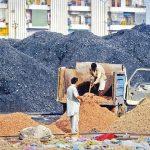Exactly a year ago, 17 people died and hundreds of others were affected in Keamari due to a mysterious gas leakage in the area. The reason remained untold.
However in a recent report submitted to the Sindh High Court, the Sindh Environmental Protection Agency (Sepa) revealed that it was parameters of carbon monoxide and particulate toxic matters exceeding the prescribed limits of the provincial environmental quality standards during the soya bean offloading at the Karachi port, which caused high intensity of dust emission during the process of unloading of soya bean.
Sepa also mentioned in the report that the data of the air quality index of the Keamari area indicated the air at that time was contaminated with pollutants detrimental to human health.
The report further maintained that the main threat to the urban population in the vicinity of Railway Colony, Clifton and Sea View is from soybean dust and pet-coke piles and also fugitive dust emission in the form of carbon monoxide, hydrogen sulfide, sulphur dioxide, volatile organic compounds, ozone and particulate matter (MP2.5 & MP10). Residents of the areas, especially children, are suffering from breathing problems and chest infections due to the coal dust entering their lungs via air.
Karachites might have forgot that tragic incident, but as a matter of fact soya bean and pet-coke are being unloaded even today at the Karachi Port Trust’s eastern wharf terminal without standard operating procedures and in the absence of any system for continuous monitoring of ambient air at the KPT premises and its adjacent areas.
It is also a bitter reality, the concerned authorities haven’t learnt anything from their mistakes as according to the same report several containers loaded with hazardous chemicals have been stored on the premises of KPT for the last three to four years unclaimed by the consignees, while surrounding area of oil terminal were found untidy and highly polluted with waste generated from oil tankers.
It is must that the KPT must handle soya bean and pet-coke only under strict international standards and regulations at specified places as handling of pet-coke and soya bean without strict measures would cause adverse effects to the human health and environment. It is good that Sepa points out at the right reason of environmental violations in the report. However, it needs to be asked form the environment watchdog what punitive measures it had taken against the culprits who violated the laws.
By
Infocus, Editorial


